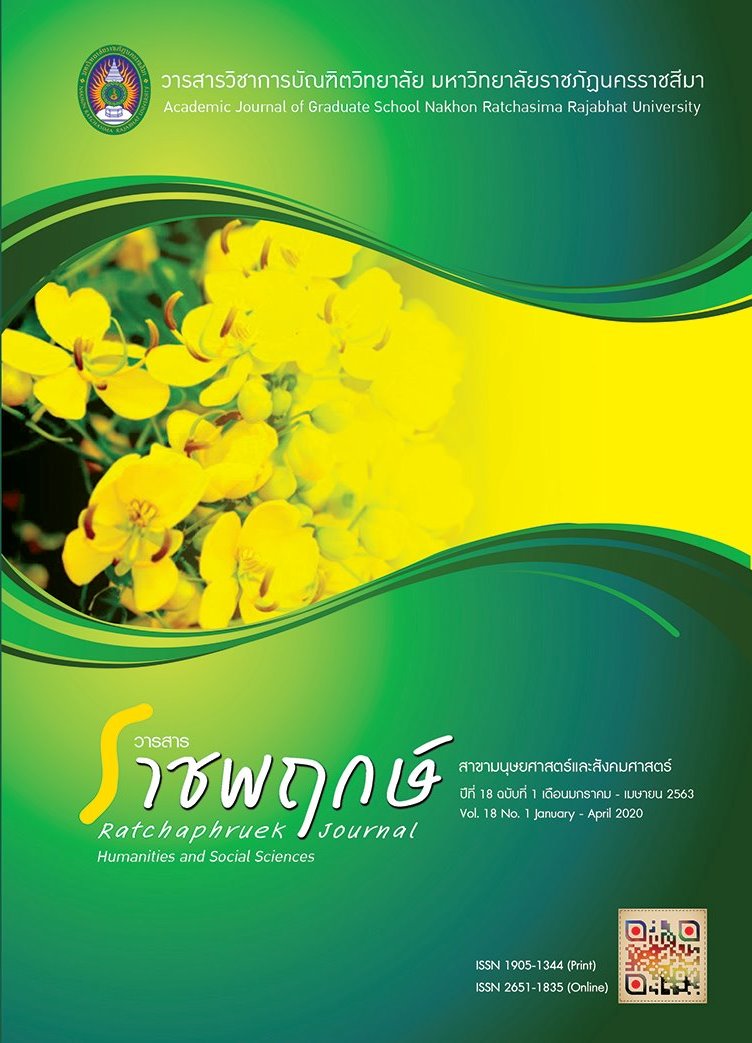Application of Iddhipada Principles in Duty Performance of the Personnel in Bangkokyai District Bangkok
Main Article Content
Abstract
This research has the following objectives : 1) to study the application of Iddhipada principles in duty performance of the personnel in Bangkokyai District Office, Bangkok, 2) to compare the application of Iddhipada principles in duty performance of the personnel in Bangkokyai District Office, Bangkok, based on their differences in gender, educational level, and work experience, and 3) to propose the guidelines of the application of Iddhipada principles in duty performance of the personnel in Bangkokyai District Office, Bangkok. 105 samples of 142 personnel in Bangkokyai District Office, Bangkok, were obtained by using the table of Taro Yamane. The data were collected by questionnaires and analyzed by frequency, percentage, mean, standard deviation, T-test, F-test or One-way ANOVA and Scheffe method.
The result of this research finding that:
- The application of Iddhipada principles in duty performance of the personnel in Bangkokyai District Office, Bangkok, was in a high level overall. In details, the highest level was on Effort, followed by Investigation, Dedication, and Aspiration respectively.
- The result of comparison, the personnel with different genders, educational levels and work experiences had no different levels in the application of Iddhipada principles in their work performance.
- The most suggestions obtained from the study were that : There should be an application of Iddhipada principles in work and the understanding of Iddhipada should be provided to the personnel. When considering each aspect ; with the highest frequency, the personnel should have knowledge, understanding of assigned duties, working with consciousness, prudence, good attitude towards both work and colleagues, followed by effort, personnel should have patience, perseverance, diligence in the duties assigned, constantly studying for knowledge to develop work and develop oneself and have patience in listening to the opinions of others, and with the least frequency, personnel should be proud and have a passion for the assignment. As for the executives, they should also apply the Iddhipada principles to their work as well. In investigation, they should consider assigning work to suit the position, knowledge, and ability of personnel, and brainstorm and make decision in the same direction. In effort, they should support and provide opportunity for personnel to study and learn for their own development and work development. In aspiration, they should build morale and incentive for the personnel.
Article Details
References
ฉัฐรักข์ วัยเจริญ. (2557). การประยุกต์ใช้หลักอิทธิบาท 4 ของผู้ปฏิบัติงานตำแหน่งประเภทสนับสนุน คณะวิทยาศาสตร์ มหาวิทยาลัยมหิดล (ศาสนศาสตรมหาบัณฑิต, มหาวิทยาลัยมหามกุฏราชวิทยาลัย).
ชาตรี แนวจำปา. (2552). การประยุกต์ใช้หลักอิทธิบาท 4 ในการปฏิบัติหน้าที่ของบุคลากรสำนักป้องกันและบรรเทาสาธารณภัย กรุงเทพมหานคร (พุทธศาสตรมหาบัณฑิต, มหาวิทยาลัยมหาจุฬาลงกรณราชวิทยาลัย).
พระชินกร สุจิตฺโต (ทองดี). (2561). การประยุกต์ใช้หลักอิทธิบาท 4 ในการปฏิบัติงานของบุคลากรองค์กรปกครองส่วนท้องถิ่นอำเภอวังน้อย จังหวัดพระนครศรีอยุธยา (รัฐศาสตรมหาบัณฑิต, มหาวิทยาลัยมหามกุฏราชวิทยาลัย).
พระธัชพล สิริภทฺโท (งามแพง). (2557). การประยุกต์ใช้หลักอิทธิบาทในการปฏิบัติงานของบุคลากรองค์การบริหารส่วนตำบล อำเภออาจสามารถ จังหวัดร้อยเอ็ด (ศาสนศาสตรมหาบัณฑิต, มหาวิทยาลัยมหามกุฏราชวิทยาลัย).
พระศักดิ์นรินทร์ สมจิตฺโต (ธรรมสุรีย์). (2561). การใช้หลักอิทธิบาท 4 ในการปฏิบัติงานของบุคลากรองค์การบริหารส่วนตำบลในเขตอำเภอเมือง จังหวัดนครศรีธรรมราช (รัฐศาสตรมหาบัณฑิต, มหาวิทยาลัยมหามกุฏราชวิทยาลัย).
ไพบูลย์ ตั้งใจ. (2554). ประสิทธิภาพในการปฏิบัติงานของพนักงานตามหลักอิทธิบาท 4 กรณีศึกษา บริษัทแอมพาส อินดัสตรี จำกัด อำเภอเมือง จังหวัดสมุทรปราการ (พุทธศาสตรมหาบัณฑิต, มหาวิทยาลัยมหาจุฬาลงกรณราชวิทยาลัย).
มหาจุฬาลงกรณราชวิทยาลัย. (2539). พระไตรปิฎกภาษาไทย ฉบับมหาจุฬาลงกรณราชวิทยาลัย. กรุงเทพฯ: มหาจุฬาลงกรณราชวิทยาลัย.
วิโรจน์ น้อยวิเศษ. (2556). การปฏิบัติงานตามหลักอิทธิบาท 4 ของพนักงานบริษัท ยูเนี่ยนเบ็ลท์ อินดัสตรี้ส์ จำกัด อำเภอเมือง จังหวัดสมุทรสาคร (ศาสนศาสตรมหาบัณฑิต, มหาวิทยาลัยมหามกุฏราชวิทยาลัย).


